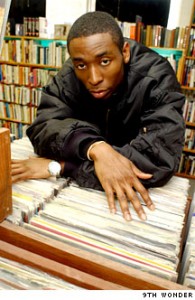When did “software based production” get popular in Hip Hop?
This is a very interesting topic but this all can be traced to one person, 9th Wonder. Back in the 1970’s when Hip Hop started everyone was rhyming over disco music. Just looping an R&B or Disco song was good enough. Beat machines were the next phase in Hip Hop. Legendary producer Kurtis Mantronik of the Hip Hop group Mantronix was a producer who popularized the The Roland TR 808 and TR 909 beat machines in the 1980’s. Then sampling became the thing to do and it was all hardware based and that hardware was very expensive to purchase. The Large Professor at 18 years of age asked his mother to purchase E-mu SP-1200 Drum Machine/Sampler which became a popular in the 1990’s. She agreed but in the process had to max out 3 credit cards for him to get it. As sampling (and getting those samples cleared – Check Episode 2 for more detail) became more of a dominant thing in Hip Hop music the hardware that was used to make music got better.
There were more options to choose from but software production was not even a relevant concept except possibly in the case of Kurtis Mantronik who was known to use Apple computers. Whether the music production software was not up to par or computer technology wasn’t readily accessible to the masses not too many people thought of using a computer and software as a viable means of music production for Hip Hop, however, this all changed in the 2000’s.
In 2003 a hip hop group that formed in North Carolina called Little Brother released an album entitled “The Listening” which was produced by Patrick Douthit B.K.A. 9th Wonder. This album was strictly produced using FruityLoops now known as FL Studio. At about the same time 9th Wonder released a remix album for Nas’s “God’s Son” LP entitled “God’s Stepson” also done with FruityLoops. Both releases garnered him respect in the Hip Hop underground and set the tone for additional work. 9th Wonder freely let the world know what software he was using to make his music. At this point music production software reached a point of serious notoriety and the ease of getting a computer and the software took it even further. Continuing his career as a producer and producing for people like Jay Z and Destiny’s Child allowed him to gain even more work as a producer and made the concept of software music production legitimate.
Now software production is just as popular if not even more popular than hardware production in Hip Hop. More music production software is out and even hybrid software/hardware music production combinations are viable as tools to make music.
The Double Edged sword:
As I mentioned before back in the day music production was expensive but now anyone can afford a computer and some type of music production software. So, anyone can try to be a producer with a small monetary investment and that has helped those with talent who just couldn’t afford hardware for music production. However, not everyone should be trying to make music which we’ve all witnessed on Strictly Hip Hop’s Producer’s Test Bin. Just because you have FL Studio, Reason, Maschine or any other software or software/hardware combination doesn’t mean you can make good music. I digress…
Simply put, in Hip Hop software production was not even thought about as a legitimate way to make music but after 9th Wonder (and we have to respectfully add FruityLoops aka FL Studio) it has become a very credible way and perhaps preferred way to make music.
If you have any discrepancies to what you just heard, comments on what you just heard or have new ideas on who or what changed hip hop then send an email to patrick@patrickscientific.com
This is Patrick Scientific and until next time peace
Audio Verison as done originally on Strictly Hip Hop on WEAA 88.9 FM below.


